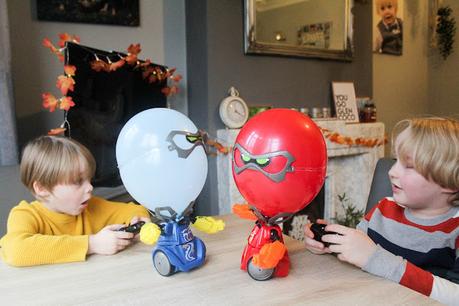
Education doesn't always have to be confined to textbooks and formal lessons. In the world of home education, learning happens in a myriad of delightful ways, often without our children even realizing they are absorbing valuable knowledge. As child-led home educators, we focus our attention on providing our kids with lots of opportunities to explore and learn in ways that they often don't even realize are educational. Let's explore the diverse ways our home-educated children experience the joy of learning without even noticing!
1. Board Games - Where Learning Takes on a Whole New Dimension:
When your family gathers around the table for a board game night, you may think it's all about having fun. However, these game sessions are cleverly designed to stimulate young minds, fostering cognitive, social, and problem-solving skills. Games like Scrabble enhance vocabulary and spelling proficiency, while Monopoly teaches financial management and decision-making. Even classics like Chess and Checkers develop strategic thinking and analytical abilities. The laughter and excitement may be the focus, but the learning is seamlessly woven into the fabric of play. We have some fantastic board games which are targeted at developing literacy or maths skills, and these are so beneficial in our child-led home ed lifestyle.
2. Puzzles - Piecing Together Knowledge:
Puzzles are the epitome of stealth learning! As children navigate through jigsaw puzzles, spatial awareness and fine motor skills are honed. Jigsaw puzzles featuring maps and historical landmarks inspire geographical curiosity and cultural knowledge. Puzzles with animal and plant illustrations spark an interest in the natural world, encouraging our young learners to explore ecosystems and habitats. Meanwhile, the satisfaction of completing a challenging puzzle instils perseverance and a growth mindset, valuable life skills in disguise.
3. Educational Days Out - Adventure with a Purpose:
Who says field trips are reserved for traditional schools? Home-educated children relish educational days out as much as anyone! Visits to museums, science centres, historical landmarks, and art galleries provide experiential learning opportunities, bringing subjects to life and making them tangible. Children can step into the shoes of historical figures, conduct hands-on science experiments, and marvel at art masterpieces, all while forging unforgettable memories. Every adventure becomes a treasure trove of knowledge, inspiring curiosity for future exploration. We utilise both group field trips with other home educating families and family trips to ensure the kids get a good mix of opportunities.
4. Educational Video Games - Learning through Interactive Fun:
In today's digital age, educational video games have emerged as a powerful tool to engage and educate home-educated children. These interactive virtual worlds seamlessly blend entertainment and learning, making the acquisition of knowledge an enjoyable experience.
Educational video games cover a wide range of subjects, from language arts and mathematics to history, science, and even foreign languages. For instance, language-learning games can immerse children in new cultures, teaching them vocabulary and conversational skills through interactive dialog. Math games can turn complex problem-solving into exciting challenges, motivating children to solve equations and puzzles.
One of the key benefits of educational video games is their adaptability to individual learning styles. Unlike traditional classrooms, where teaching is often standardized, video games can personalize the learning experience for each child. These games can assess a child's current skill level and adjust the difficulty accordingly, ensuring that they are neither overwhelmed nor bored.
The immediate feedback given in most video games allows them to learn from their mistakes and reinforce correct answers, accelerating the learning process. Such feedback loops instill a sense of achievement and encourage children to persist in their quest for knowledge.
Additionally, many educational video games promote collaborative learning, allowing children to work together in virtual environments. This fosters teamwork, communication, and problem-solving skills, while also creating an opportunity for social interaction, even in the absence of physical classmates.
We like to utilise the childrens favorite games on their chosen consoles as well some free to play online games from websites such as solitaire.org - one favourite is "Battleships Armada" - this is an engaging and strategic online game that combines the classic gameplay of Battleship with the thrill of naval warfare. Set in a visually stunning oceanic environment, players embark on a quest to outsmart their opponents by skillfully placing their fleet and strategically launching missiles to sink enemy ships. The game offers multiple challenging levels, each requiring players to adapt their tactics and refine their targeting skills. With its intuitive controls and immersive gameplay, "Battleships Armada" offers hours of entertainment for both seasoned Battleship enthusiasts and newcomers to the genre, providing an exhilarating experience of commanding a fleet and emerging victorious on the high seas.

5. Cookery - Nurturing Creativity and Life Skills:
Cooking is an art that doubles as a learning experience for home-educated children. In the kitchen, math skills come alive as they measure ingredients, and fractions become real when halving or doubling recipes. Reading recipes sharpens language comprehension, and understanding the science of cooking unlocks the magic of transformation. Moreover, cooking brings cultures together, providing an opportunity to explore international cuisines and traditions. Most importantly, the joy of sharing a meal prepared with love instils empathy and the importance of family bonds.
6. Storytelling - Unleashing the Power of Imagination:
Storytelling is an ancient tradition that captivates young minds and fuels their imagination. Whether parents read aloud or children create their narratives, stories transport them to different worlds and eras. Through fairy tales, folklore, and historical accounts, children learn about morals, values, and the human condition. They develop empathy by empathizing with characters and learn to anticipate plot twists and infer character motivations, fostering critical thinking. Storytelling also enhances verbal communication skills, as they articulate their ideas and immerse others in their narratives.
7. Creative Arts - Expressing Ideas through Creation:
Home-educated children often find solace and inspiration in the creative arts. Drawing, painting, sculpting, and crafting enable them to express their thoughts and emotions visually. They learn about colours, shapes, and perspectives, enhancing their visual-spatial abilities. Moreover, creative arts foster self-expression and boost self-esteem as they witness their artistic abilities evolve over time. Dance and music also play a vital role, providing a channel for emotional release and enhancing coordination, rhythm, and creativity.
Home education is a journey that celebrates learning in all its forms. There are countless opportunities for our children to learn without even realizing it. Through play, adventure, and creativity, they develop critical thinking, problem-solving, empathy, and self-expression - skills that will serve them well throughout life. So, as parents and educators, let's continue to nurture their love for learning, making every moment a chance for them to grow, discover, and find joy in the vast world of knowledge that surrounds them.
If you enjoy my blog, please consider following me on Bloglovin'
